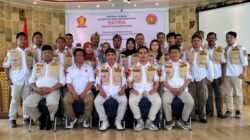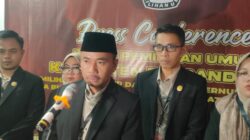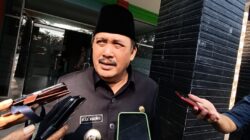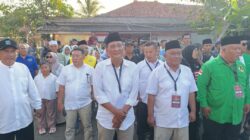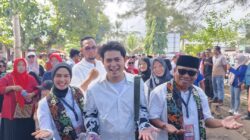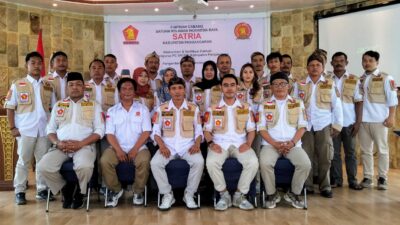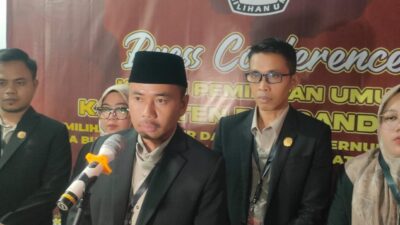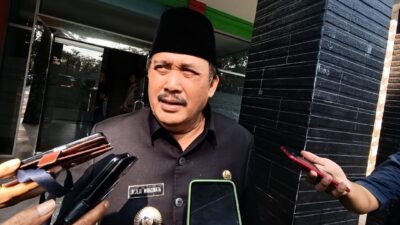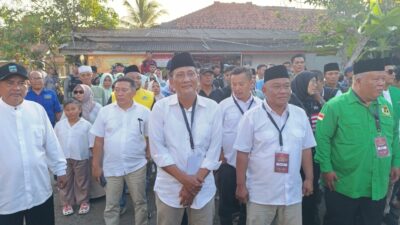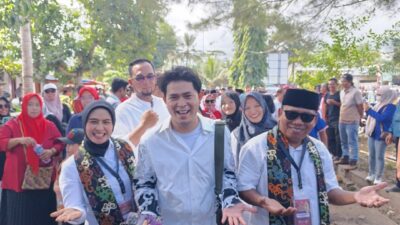Mochamad Iriawan alias Iwan Bule (bercelana dan berbaju t-shirt) foto bersama pemain bola dalam pertandingan Persib Legend vs Kuningan Selection, Jumat 12 Januari 2024 di Kuningan.
MASNIM PENDUDUKAN masa pensiun setelah meraih prestasi gemilang sebagai anggota kepolisian, Komisaris Jenderal Polisi (Purn.) Dr. Drs. H. Mochamad Iriawan, S.H., M.M., M.H., sekarang beralih ke dunia politik. Jenderal polisi yang dikenal luas dengan nama Iwan Bule, sekarang memilih untuk menjadi politisi dan mencalonkan diri sebagai calon legislatif untuk Dewan Perwakilan Rakyat Republik Indonesia (DPR RI) di daerah pemilihan Jawa Barat X.
Lahir pada tanggal 31 Maret 1962, lulus dari Akademi Kepolisian pada tahun 1984, bukan hanya seorang mantan polisi; dia adalah seorang profesional berpengalaman yang telah meninggalkan jejak yang tak terhapuskan di berbagai bidang. Selama karir kepolisiannya, dia menangani kasus-kasus penting, termasuk pembunuhan Nasrudin Zulkarnaen yang melibatkan tokoh-tokoh terkemuka di Indonesia.
Tidak hanya itu, sebagai seorang kepala kepolisian daerah (Kapolda) di tiga daerah, mulai dari Kapolda NTB, Kapolda Jawa Barat, hingga Kapolda Metro Jaya, Iwan Bule telah memperlihatkan kepiawaiannya dalam menjaga keamanan masyarakat.
Pada masa kepemimpinannya, karakter yang humanis membuatnya selalu memberikan perhatian utama terhadap partisipasi seluruh anggota dalam setiap keputusan dan kegiatan di institusi yang dipimpinnya.
He is confident that every individual has a unique value, their contribution is very important for the development of an organization or community, and that cannot be ignored. Therefore, Iwan Bule is often recognized as a leader who prioritizes relationships with the community.
Iwan Bule’s approach in carrying out his duties and responsibilities as a police official has always reflected his ability to lead with a humanistic touch. He gives his subordinates the opportunity to develop to the fullest, is open to new ideas, and is always willing to listen to the aspirations of the community. His friendly nature with various layers of society makes him accepted by various circles.
During his tenure as the Chief of Police in these three provinces, Iwan Bule has established cooperation with various groups, including community leaders, religious leaders, and intellectuals. He is also known to be close to the lower classes, going directly to the field to listen to the problems of the community and find solutions together.
An approach like this creates a sense of trust and closeness between Iwan Bule and the people, making him an easily accessible leader who is connected to the reality of the community. His ability to interact with various groups of society makes him able to explore various aspirations and integrate them into programs that are beneficial to the community.
In every role as Kapolda, Iwan Bule has always shown effective and transparent leadership. His understanding of the importance of cooperation between the police force and the community to create a safe and conducive environment is one of the many keys to his success. Not only that, he is known as a figure with a clear vision and able to make the right decisions in complex situations.
Iwan Bule’s commitment to improving the welfare of the people is reflected in his programs that provide real benefits to the community. By understanding and responding to the aspirations of the people, he has managed to direct police policies towards solutions that are in line with the real needs of the people.
Seeing his outstanding track record, the presence of Iwan Bule in the political world as a candidate for members of the DPR-RI is believed to make a major contribution to the development of the country. The public’s trust in him as a reliable figure, experienced, and with good leadership, makes him a worthy candidate for the next election. He can be an effective link between government policies and the needs of the people, and bring a humanistic and inclusive leadership style to the political stage.

